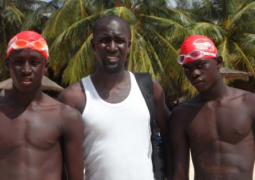The opposition United Democratic Party (UDP) is open to calls for national unity, but only if it is done in a transparent, open and respectful manner, Ousainou Darboe, leader of the UDP has said.
Darboe, who lost to incumbent President Yahya Jammeh in the 24th November presidential election, was speaking to journalists at a press conference convened by the UDP/GMC alliance held Monday in Pipeline.
“My doors are open for national unity and dialogue, but as I have said, this is not the way it should be done, especially to a respectable person like me,” Darboe said.
His comments were in response to calls by President Yahya Jammeh for all and sundry to work together for the betterment of the country.
“We do not hate anybody; we love this country, and we would prefer that those who have lost should come and we work as Gambians. At the end of the day, only we the Gambian people can make this country a better country,” Jammeh told thousands of jubilant APRC supporters in
“We are not dissociating ourselves from the electoral process, but then our participation has laid credence to what ECOWAS has said prior to the election,” Darboe told newsmen.
According to him, Jammeh should have approached the opposition in a different way, and not in the way he did it in public.
“He cannot just stand there and say I am prepared to work with people,” Darboe said, adding that if he is to work with Jammeh in a unity government, it must be based on terms and conditions.
“One of those conditions shall be that there has to be a full investigation into how the massive electoral fraud has occurred; there has to be full investigation into how Daba Marenah, former National Intelligence Agency chief and others disappeared, among others,” Darboe told journalists.
Quizzed by journalists whether the UDP will file a petition in court against the IEC verdict, the UDP leader said “the constitution offers us 15 days within which to lodge a petition at the Supreme Court to challenge the validity of the elections.”
He added that he had practised in the Supreme Court for several years, and had looked at that provision, but there is nothing that allows for the extension of time within which one may file a petition.
“You have to put in all your materials before the court. With the limited period of time, we cannot file a petition because we are receiving latest information from our agents, and we do not have all the information because our investigation is still ongoing,” he added.
Darboe noted that in other jurisdictions, the law provides for a longer period, usually 30 days within which aggrieved parties could put things together.
The UDP leader further stated that his party’s rejection of the presidential poll results does not mean that they are going to disengaged themselves from the electoral process of this country.
“We will not leave the political terrain to APRC or any other party to exploit in our absence,” he said, adding that the UDP will never again boycott elections in The Gambia.
“We will stay engaged at each stage of the electoral process. The fundamental mistake that Gambians always make is that they equate contesting elections with participating in politics. There is a fundamental error in that, because I don’t have to contest elections to participate in politics,” he explained further.
He told journalists that his personal participation in politics is not dependant on him contesting elections.
“I have made it clear that the fact that I am the leader of UDP is not a guarantee that I am going to contest elections under the UDP ticket. Participating in politics is not equivalent to contesting elections,” Darboe said in response to questions as to whether he will contest elections again.
Mai Ahmad Fatty, leader of the opposition Gambia Moral Congress, which is in alliance with the UDP, also spoke at the press conference.


